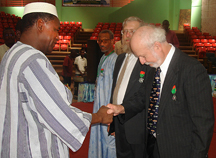2 from Purdue receive Burkina Faso's highest honor for PICS
October 22, 2012
 |
|
Larry Murdock (right) and James
"Jess" Lowenberg-DeBoer (center) receive the National Order medal
from Gnisa Isaïe Konaté, Burkina Faso minister of scientific research and
innovation. The Purdue faculty members received Burkina Faso's highest honor
during a ceremony in the "Maison de Peuple" (House of the People) in
Ouagadougou, Burkina Faso. (Burkina Faso National Institute for Environmental
and Agricultural Research photo/ Quattara Kaly Amos) |
WEST LAFAYETTE, Ind. - Purdue University College of Agriculture faculty members Larry Murdock and James "Jess" Lowenberg-DeBoer received the highest honor given by the West African nation of Burkina Faso for their work in improving storage of the staple cowpea crops.
The Chevalier de l'Ordre National du Burkina Faso, the equivalent to the U.S. Presidential Medal of Freedom and rarely given to foreigners, was awarded to Murdock and Lowenberg-DeBoer on Oct. 13 during the pair's visit to the country. The word "Chevalier" translates to "Knight."
"The high-level honor we received is a direct consequence of the priority that the Burkinabés put on food security," Murdock said. "Jess and I are overwhelmed by the honor. To be thought of in such high regard by the Burkinabé people is truly humbling."
Murdock, a professor of entomology, has been researching pest-management techniques in Africa since 1987. He developed the technology that led to the Purdue Improved Cowpea Storage (PICS) project, a five-year initiative to improve cowpea storage in West and Central Africa. The PICS program is under way in Nigeria, Niger, Ghana, Mali, Senegal, Cameroon, Benin, Togo, Chad and Burkina Faso.
Lowenberg-DeBoer, an associate dean of the College of Agriculture, director of Purdue's International Programs in Agriculture and a faculty member since 1985, has been working to help solve food problems in Africa since 1988.
"The effectiveness of this simple technology continues to amaze me," Murdock said. "It uses ordinary materials manufactured in Africa to almost completely control the insects in stored grain without chemicals."
With the PICS system, farmers place their cowpeas in a polyethylene bag and seal it. That bag is surrounded by another, identical bag and sealed, and the double-bagged crop is held within a third, woven polypropylene bag. The woven bag gives strength to the unit and allows the bag to be handled without bursting the inner polyethylene bags. The inner bags deprive the insects of oxygen and the water insects make with that oxygen. The insects eventually die due to desiccation.
The PICS project, which began in 2007, found that hermetic storage of the cowpea, known in America as the black-eyed pea, was practical and profitable for African farmers and ensured a supply of the nutritious legume for many months after harvest. Without the storage, farmers have to sell their cowpeas immediately after harvest when the price is lowest or treat them with sometimes dangerous and costly insecticides.
PICS has conducted cowpea storage demonstrations in nearly 31,000 West African villages and sold nearly 2 million grain storage bags, which are made throughout West Africa.
"Farmers in these West African nations are eager to buy these bags because they conserve more food for family consumption and help increase farm income," Lowenberg-DeBoer said. "The bags have enabled the Burkinabé to increase their own food security in a nation that has a history of famine and malnutrition."
PICS bag prices vary from country to country but usually are in the range of $2-$3, Murdock said. In Burkina Faso, the bags are retailing in rural areas for $2.20.
"With this small investment, farmers can earn $25-$50 per bag of cowpeas stored," he said. "This is important in a country where, according to the United Nations, 45 percent of the population lives on less than $1 per day."
The project is funded by grants of $12 million by the Bill and Melinda Gates Foundation.
While the award honors Murdock and Lowenberg-DeBoer and the program's goal to have 50 percent of cowpeas in West and Central Africa stored using the hermetic method this year, Lowenberg-Deboer said the Burkina Faso government also is honoring a 30-year association with Purdue, starting with Bill Morris of the Department of Agricultural Economics in the mid-1970s.
More information on PICS is available on the project's website at https://ag.purdue.edu/ipia/pics/Pages/home.aspx
Writer: Tom Campbell, 765-838-3788, tsc@purdue.edu
Sources: James "Jess" Lowenberg-DeBoer, 765-494-6876, lowenbej@purdue.edu
Larry Murdock, 765-494-4592, murdockl@purdue.edu
Ag Communications: (765) 494-2722;
Keith Robinson, robins89@purdue.edu
Agriculture News Page

